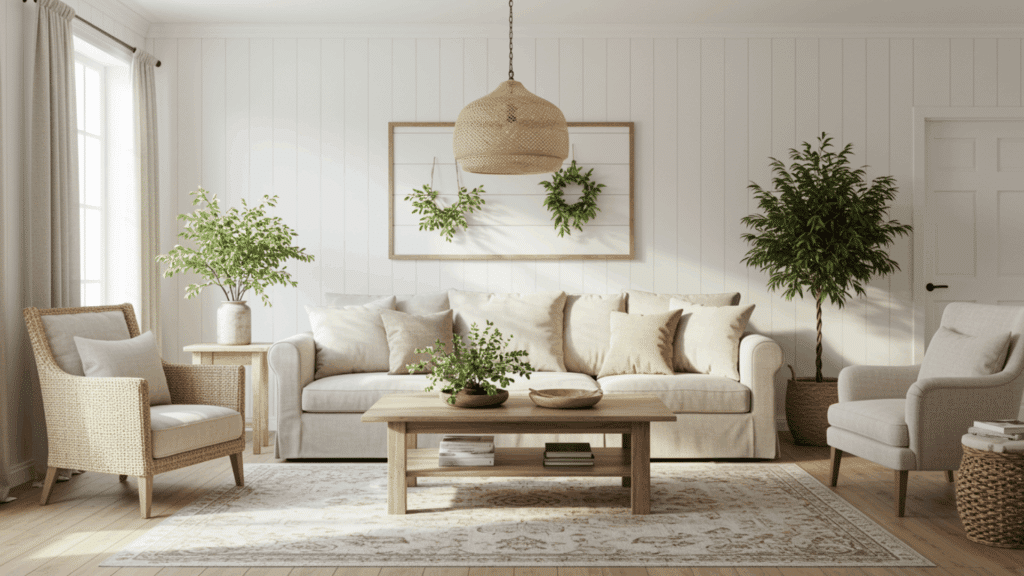Farmhouse living rooms steal hearts everywhere. Those cozy spaces mix touches with clean lines. People love how shiplap walls pair with sleek sofas.
But creating that perfect balance? That’s tricky. Too much vintage feels dated. Too much modern loses the warmth.
Blending farmhouse with modern comfort is totally doable. The right mix creates rooms that feel both timeless and fresh.
This guide walks through stunning farmhouse living rooms. Each one shows how to nail that sweet spot between old and new. Get ready to change your space into something special.
Key Elements of Farmhouse Living Room Design
A farmhouse living room feels inviting because it combines warmth and originality. The design focuses on creating a lived-in, welcoming atmosphere.
Here are the key elements that work harmoniously to create a space that’s not only beautiful but also deeply comforting:
| Element | Description | Key Features |
|---|---|---|
| Neutral Palette | Creates a calm, inviting backdrop. | Whites, creams, grays, beige tones. |
| Natural Materials | Adds warmth and texture. | Wood, linen, jute, metal, stone. |
| Vintage Finishes | Brings character | Reclaimed wood, antiques, distressed paint. |
| Functional Comfort | Emphasizes coziness and usability. | Plush seating, soft throws, layered rugs. |
Farmhouse Living Room Ideas for A Modern Look
These modern living room ideas prove that comfort can beautifully coexist in one inviting space.
1. Shiplap Feature Wall
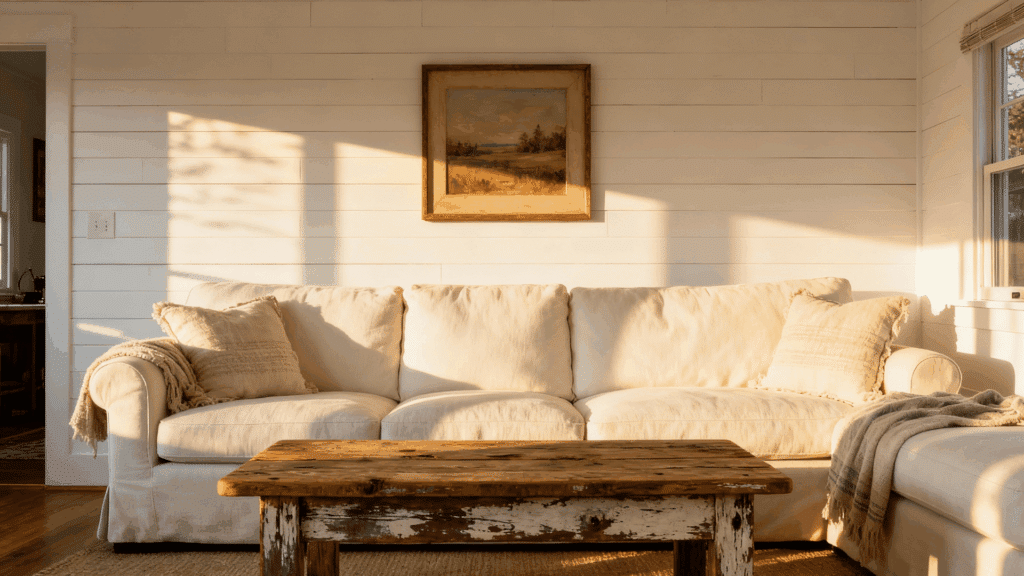
Install horizontal shiplap planks on one accent wall to create instant farmhouse character and structural interest.
Paint in classic white for brightness or soft gray for subtle appeal. The linear grooves add texture and dimension while serving as a beautiful backdrop for artwork or mounted televisions.
Shiplap works behind sofas, fireplaces, or as a full room treatment, bringing coastal-meets-country that’s both timeless and on-trend in design.
2. Oversized Sectional Comfort
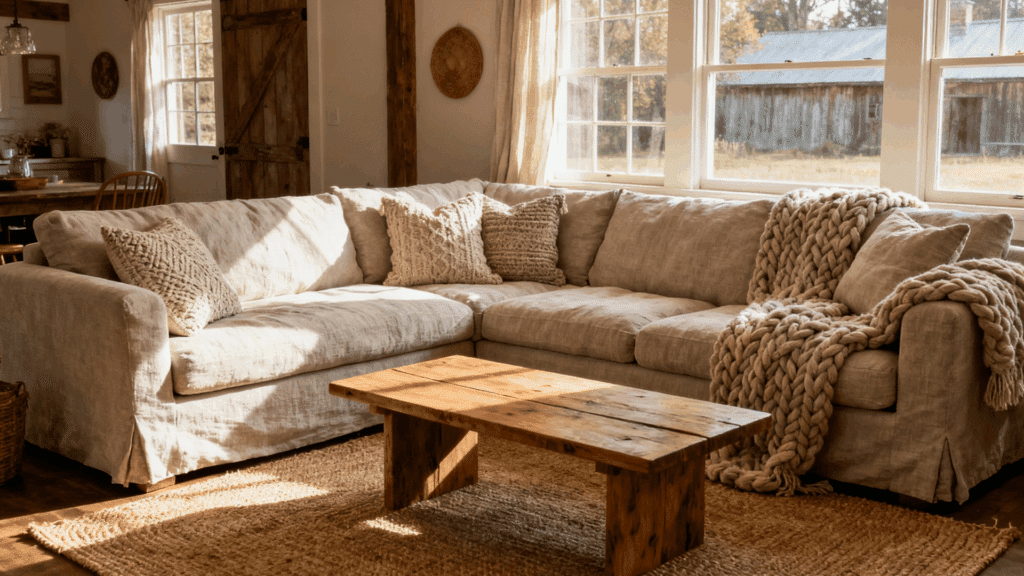
Anchor your living room with a generous sectional sofa in neutral linen or cotton upholstery that invites relaxation and accommodates gatherings.
The substantial seating creates a cozy foundation for farmhouse style while providing practical, family-friendly comfort.
The oversized proportions balance elements while encouraging the laid-back, welcoming atmosphere central to living.
3. Reclaimed Wood Coffee Table
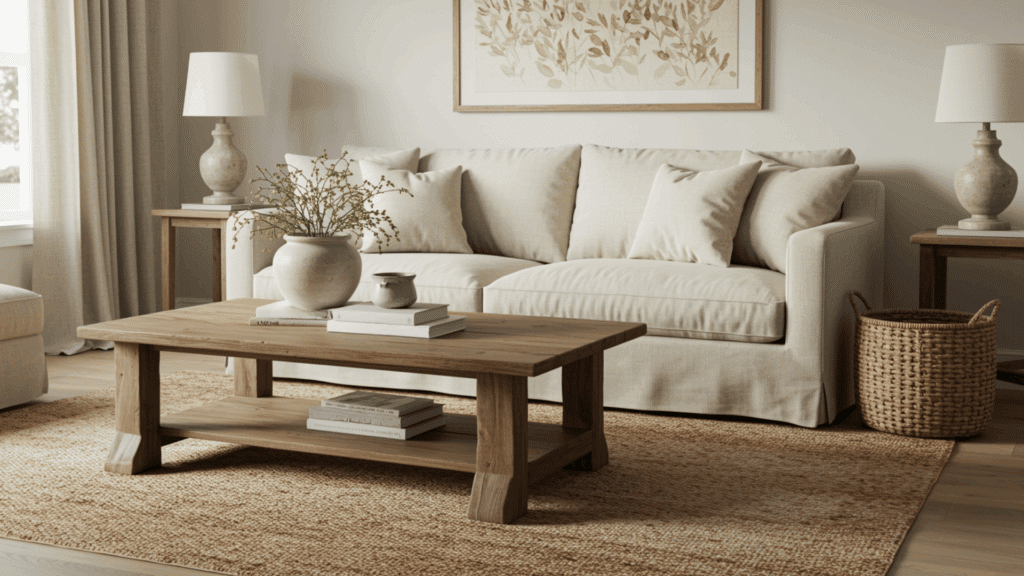
Center your seating area with a coffee table crafted from weathered barn wood or salvaged timber, showcasing natural imperfections.
Each piece tells a story through knots, nail holes, and patina developed over decades. Pair with more refined elements to prevent overwhelming.
These tables provide durable surfaces for everyday use while serving as conversation-starting focal points celebrating sustainable design.
4. Exposed Ceiling Beams
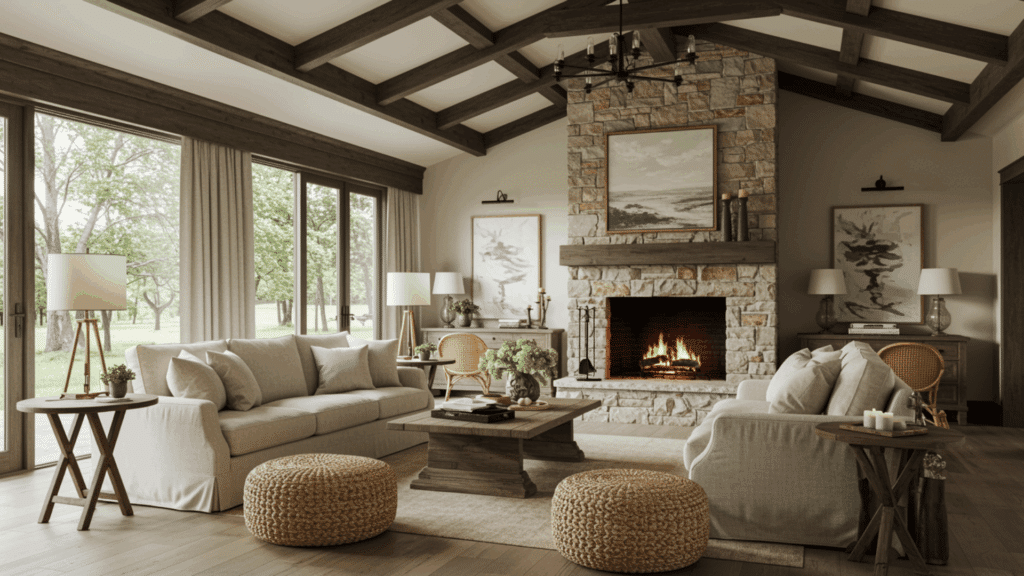
Install or reveal wooden beams across ceilings to add dramatic structural character.
Dark-stained beams create a striking contrast against white ceilings, while lighter woods offer subtle texture. The horizontal lines draw eyes upward, making rooms feel more spacious.
Beams can be structural or decorative, reclaimed timber, or new wood treated for an aged appearance. This feature anchors style overhead while adding visual weight.
5. Neutral Color Foundation
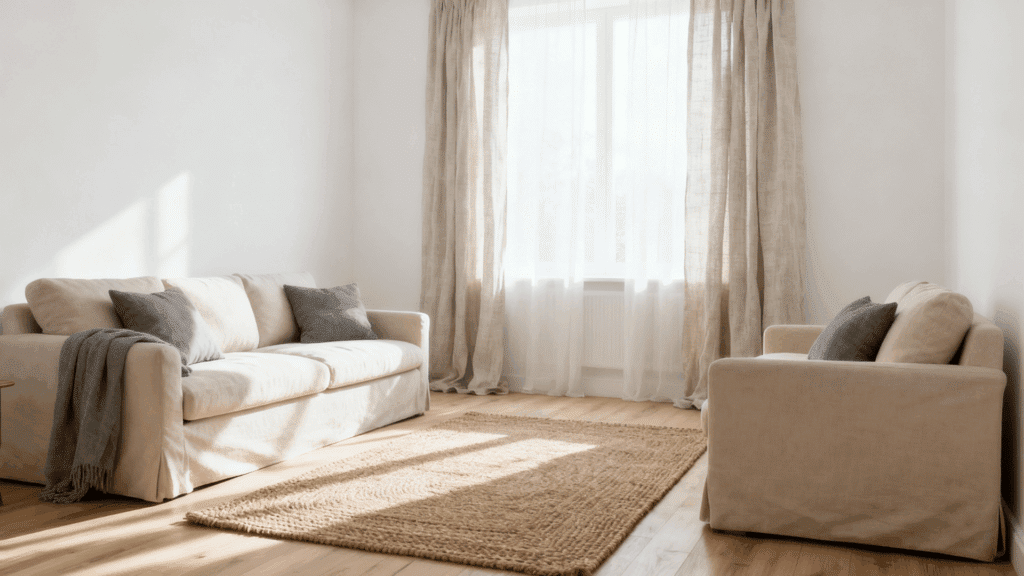
Establish a backdrop using whites, creams, beiges, and soft grays throughout walls, large furniture pieces, and foundational elements.
This restrained palette creates calm, cohesive spaces that feel larger and brighter while allowing structural features and textures to shine.
Layer various neutral tones for depth rather than monotony. The timeless supports simplicity while accommodating evolving personal style.
6. Vintage Trunk Storage
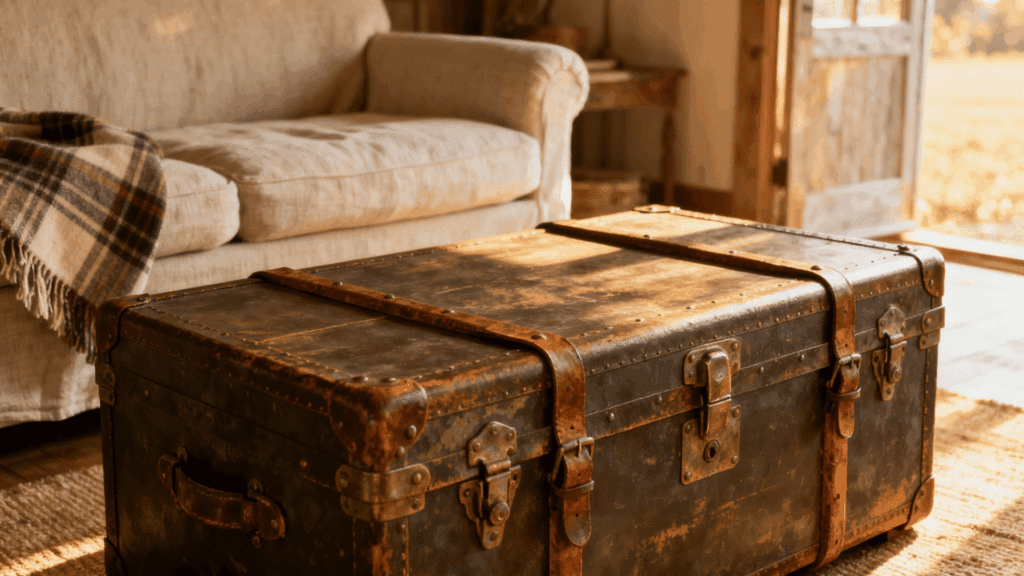
Repurpose antique steamer trunks or wooden chests as coffee tables or side tables, offering hidden storage with a nostalgic touch.
These pieces add character through worn leather, metal hardware, and travel stickers telling stories of past journeys. Use them to store blankets, games, or media equipment.
The substantial forms ground seating areas with history and personality. Stacked trunks create unique side tables with vertical interest and accessible storage.
7. Farmhouse Chandelier
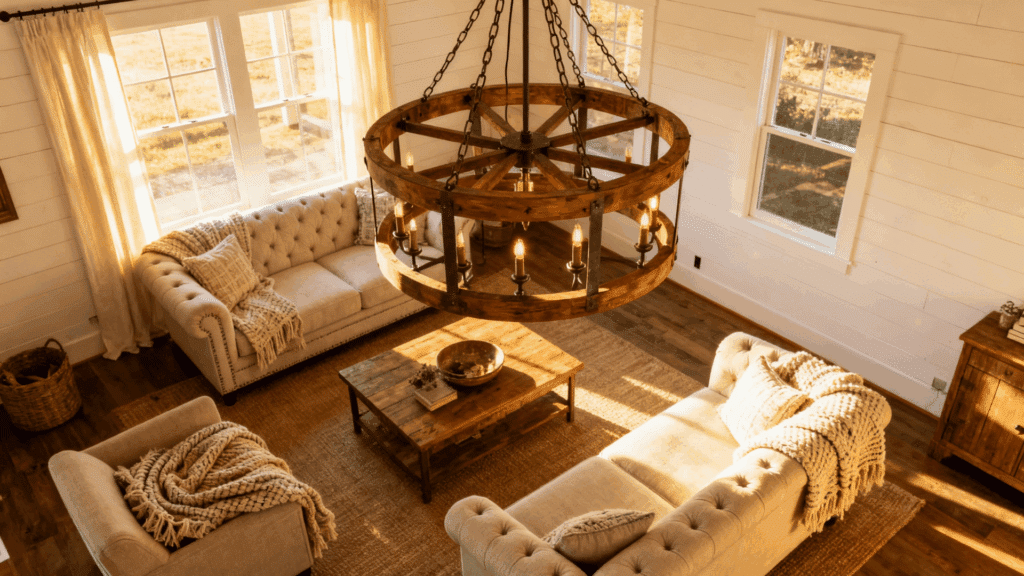
Hang a statement light fixture featuring wood, metal, or candelabra-style elements as a living room focal point.
Oversized chandeliers add unexpected elegance while maintaining its appeal. The dramatic lighting creates ambiance and draws eyes upward, balancing vertical space.
Choose fixtures proportional to room size; larger spaces accommodate grander designs. Dimmable options allow adjusting the mood from bright gatherings to cozy evenings.
8. Cozy Reading Nook
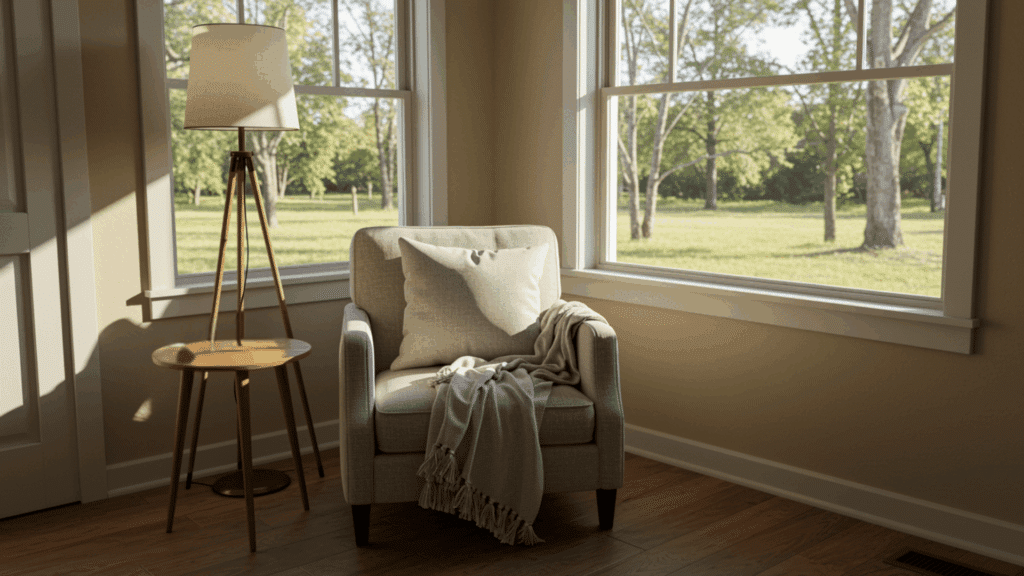
Designate a corner with a comfortable armchair, floor lamp, and small side table, creating an inviting retreat for reading and relaxation.
Position near windows for natural light or create intimate corners with warm lighting. Add a small bookshelf or basket for current reads.
This personalized space provides quiet respite within the living room while adding compositional balance and demonstrating thoughtful design.
9. Sliding Barn Door
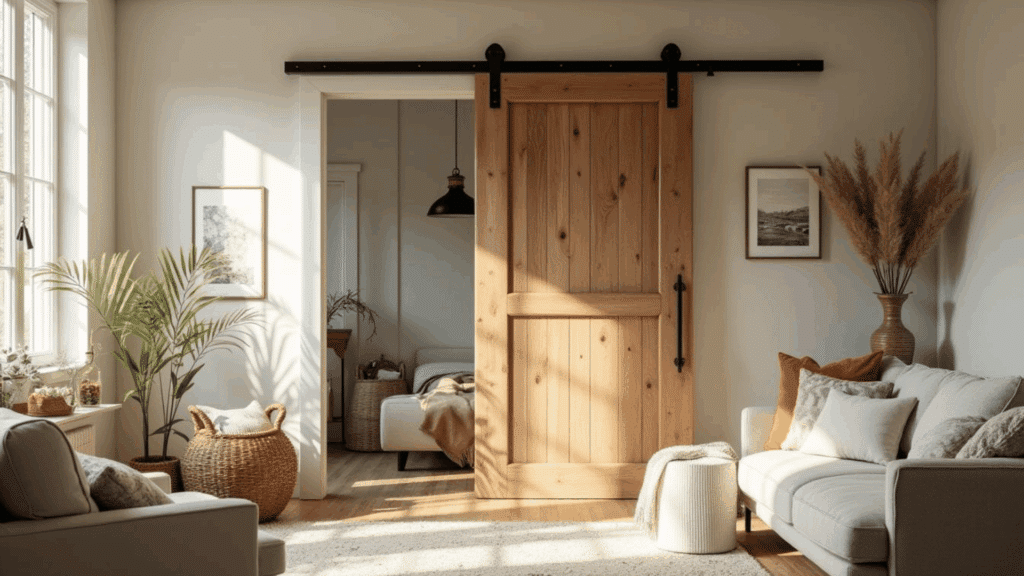
Install a sliding barn door on exposed hardware to separate living spaces or conceal storage while making structural statements.
The movement and texture add dynamic interest to walls while saving the floor space traditional swing doors require. Choose reclaimed wood for authenticity or with distressed finishes.
The industrial metal track becomes decorative hardware, complementing aesthetics. This functional art piece works for closets, entertainment centers, or room divisions.
10. Fireplace Focal Point
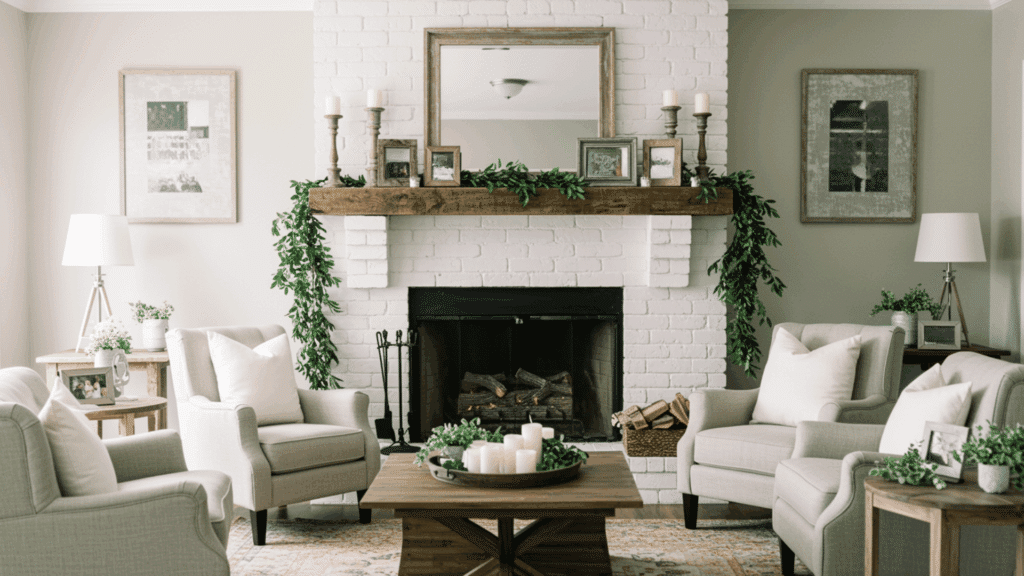
Make your fireplace the room’s heart with painted brick, wood mantels, and curated seasonal displays. Whitewash existing brick for fresh updates, mantels for a substantial presence.
Style with vintage finds, candles, greenery, and family photos, creating layered vignettes. The fireplace naturally draws gathering and provides structural anchoring.
Flank with built-in shelving or windows for symmetrical balance. This timeless feature embodies warmth and hospitality.
11. Jute or Natural Fiber Rug
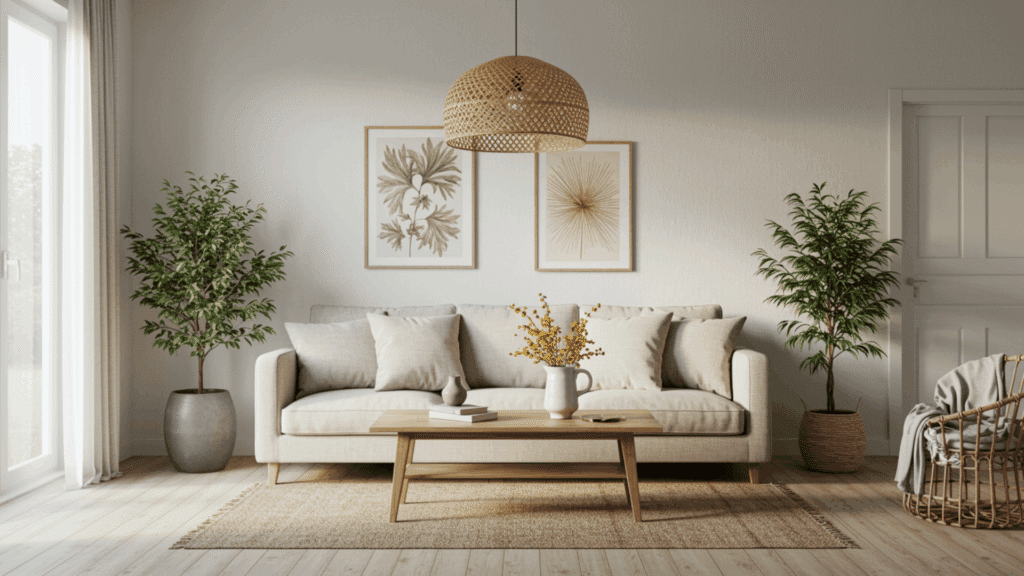
These durable natural fibers withstand traffic while introducing subtle patterns through weave variations.
The neutral tones complement any palette and add casual, laid-back appeal. Layer smaller patterned rugs over larger natural fiber ones for dimension.
These eco-friendly options suit the farmhouse’s emphasis on natural materials and practical beauty, softening hard flooring while defining conversation areas.
12. Gallery Wall Display
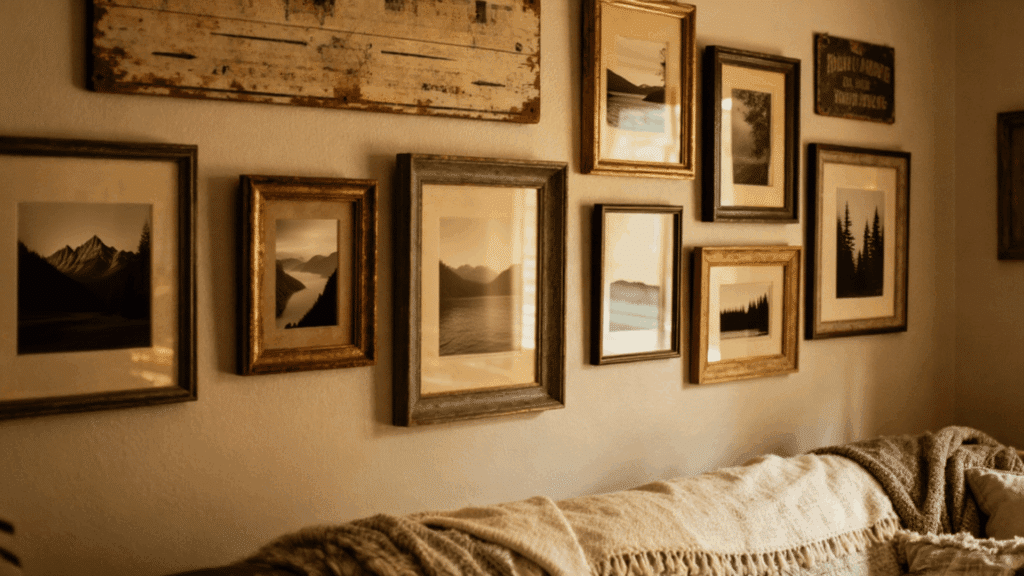
Create a curated wall arrangement mixing family photos in mismatched frames, vintage signs, structural salvage, and meaningful artwork.
The collected-over-time aesthetic feels personal and authentic rather than overly designed. Include various sizes and frame styles unified by a color palette or theme.
Arrange the floors before hanging to perfect the layout. Gallery walls add personality and tell family stories while filling vertical space with visual interest that evolves as collections grow.
13. Wingback Accent Chairs
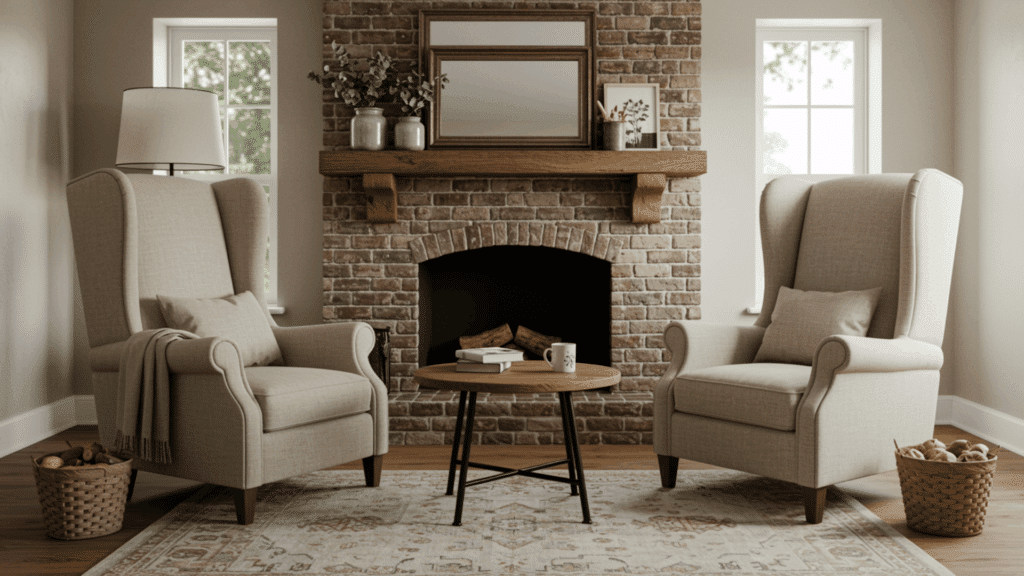
Flank fireplaces or create conversation groupings with classic wingback chairs upholstered in neutral linen or patterned fabric.
Pair two chairs facing the sofa for balanced seating arrangements. The high backs provide comfort and structural presence.
Choose slipcovered versions for casual appeal or exposed wood frames for traditional refinement. These timeless pieces bridge and refine elements beautifully.
14. Open Shelving Display
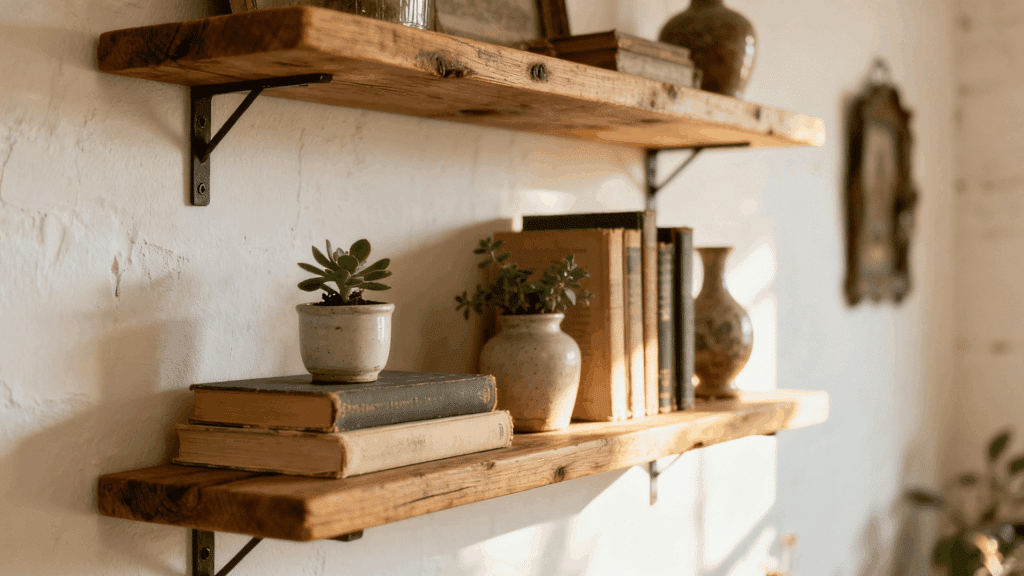
Install floating wooden shelves or metal bracket shelving for displaying books, plants, vintage finds, and decorative objects.
Style shelves with varying heights, textures, and negative space, preventing a cluttered appearance. Include functional items like baskets for concealing less attractive necessities.
The accessible display invites rearranging and seasonal updates, making rooms feel lived-in and personal rather than static showrooms.
15. Whitewashed Brick Wall
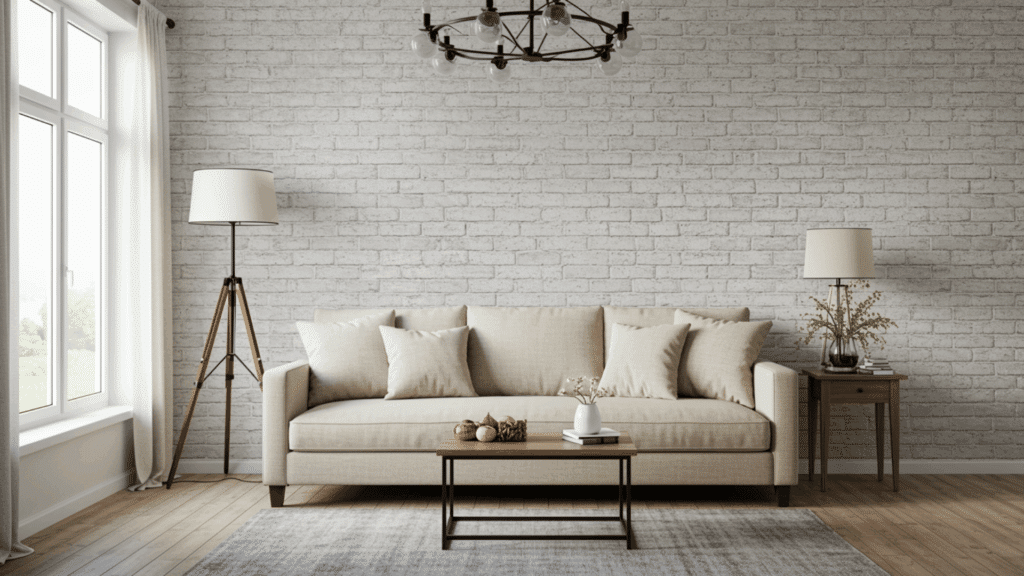
It exposed brick walls with diluted white paint, allowing texture to show through for European farmhouse elegance.
The weathered appearance feels authentic and aged, adding instant history to newer homes. Apply multiple thin coats for desired coverage, allowing natural variations.
Whitewashed brick provides neutral textured backdrops, complementing and refining furnishings, while solving dark brick challenges gracefully.
16. Chunky Knit Throws
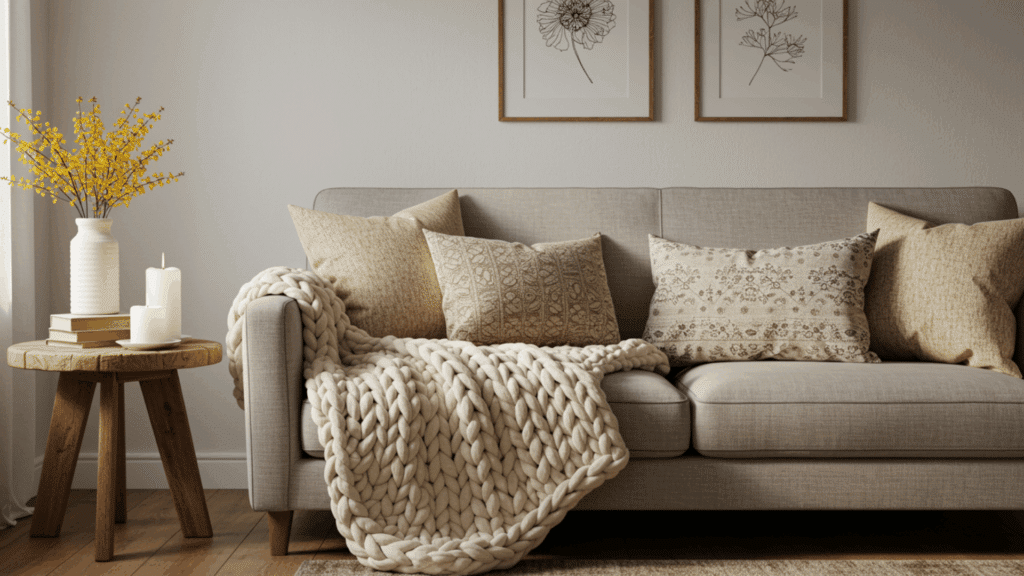
Layer sofas and chairs with oversized knit blankets in cream, gray, or soft neutrals, adding cozy texture and visual weight.
The substantial weave creates sculptural interest when draped casually over furniture. These tactile pieces invite snuggling while serving as decorative accents.
The handcrafted appearance aligns with appreciation for artisanal quality. Rotate seasonally lighter knits for summer, heavier wool for the winter months.
17. Vintage Ironstone Display
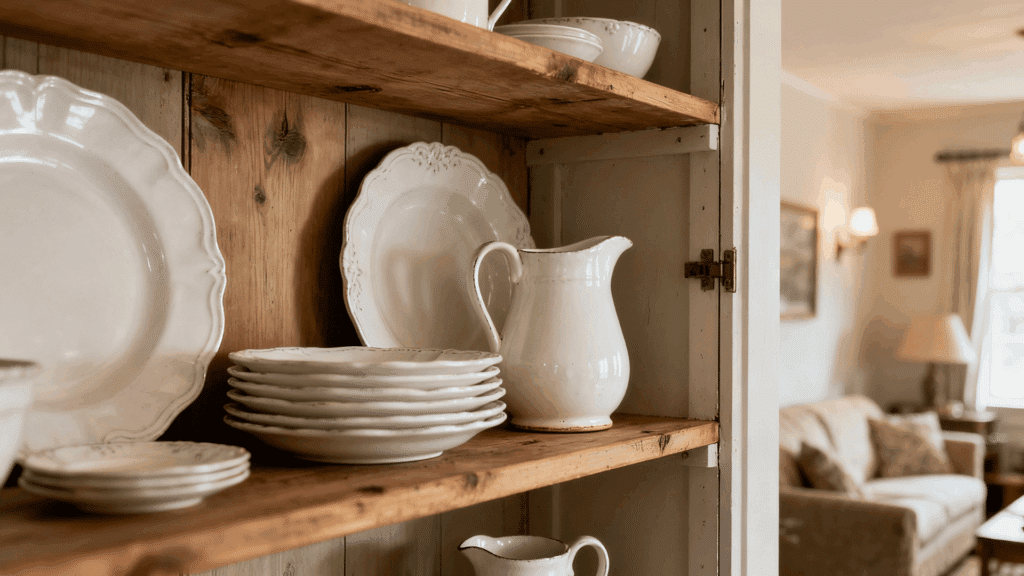
Showcase creamy white ironstone dishes on open shelving, mantels, or hutches for understated elegance. The simple forms and matte finish create cohesive displays.
Mix plates, pitchers, tureens, and serving pieces in varying sizes. The neutral tone complements any palette while the dimensional stacking adds sculptural interest.
Ironstone references practicality, durable dishes meant for daily use, yet beautiful enough to display proudly, celebrating functional beauty.
18. Buffalo Check Patterns
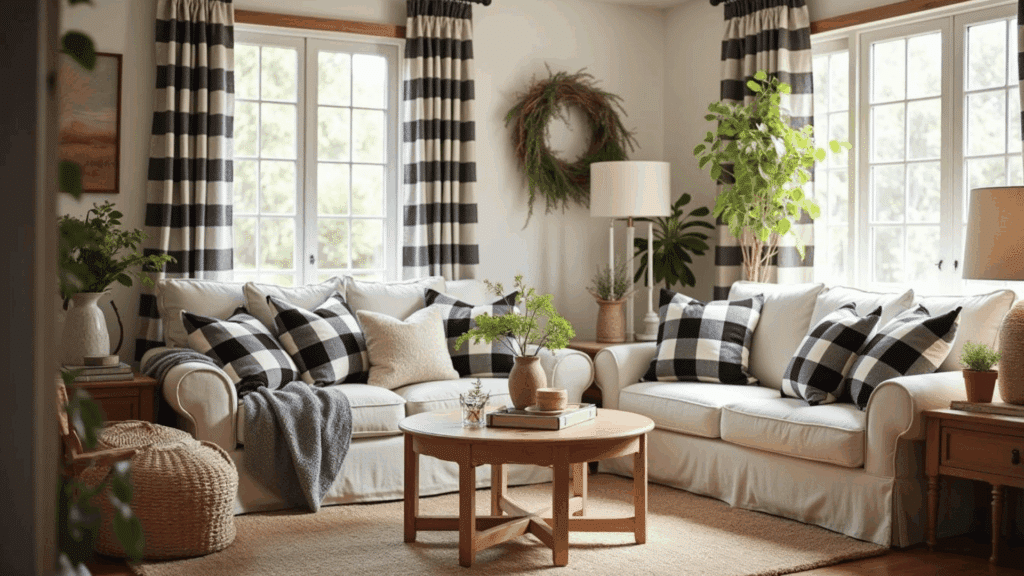
Incorporate classic black and white buffalo check through throw pillows, window treatments, or upholstered ottomans.
The bold gingham pattern adds graphic punch while maintaining coziness and versatility.
Mix with solid neutrals and subtle patterns, preventing visual overload. The large-scale checks create rhythm and work across seasons, unlike themed patterns.
19. Farmhouse Clock Statement
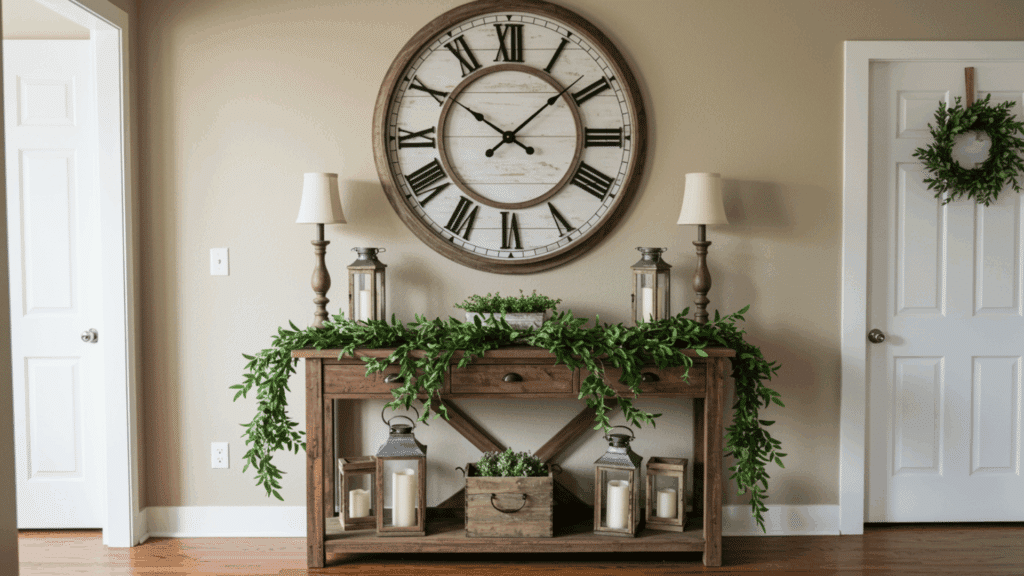
Mount an oversized wall clock with Roman numerals and a distressed finish as a functional focal point.
Choose metal frames in aged finishes or distressed wood surrounds, complementing existing elements. Position above consoles, mantels, or on prominent walls.
Large clocks eliminate multiple small decorations while providing structural interest and vintage character that grounds aesthetics with timeless appeal.
20. Cotton Stem Arrangements
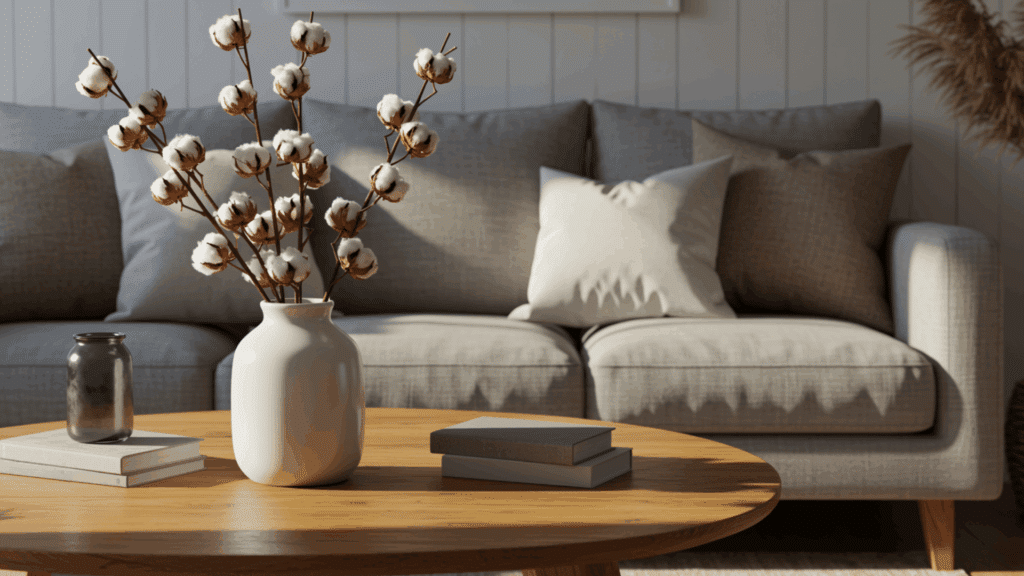
Fill tall vases or vintage pitchers with dried cotton stems for year-round organic texture requiring no maintenance.
Arrange alone for minimalist impact or combine with eucalyptus branches. Position on coffee tables, mantels, or console tables for natural beauty.
Cotton stems are a bridge, working in both casual and refined interpretations while celebrating agricultural heritage.
21. Leather Furniture Accents
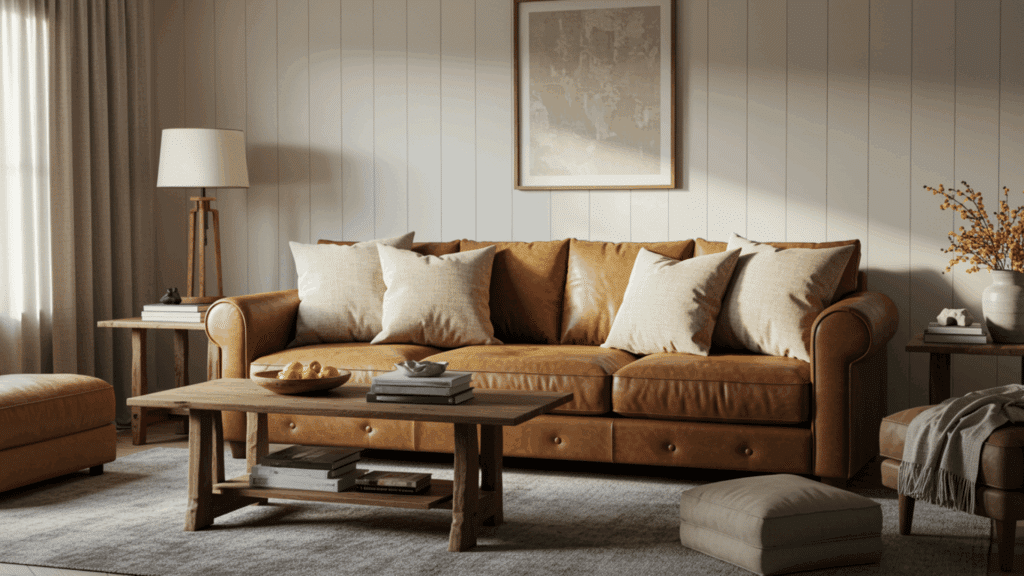
Introduce warmth through leather sofas, chairs, or ottomans in cognac, brown, or distressed finishes.
The natural material develops beautiful patina over time, improving with age and use, perfect for authenticity. Leather adds masculine balance to softer elements.
Choose top-grain or full-grain leathers for quality and longevity. The rich texture grounds spaces with earthy tones that transcend trends.
22. Woven Basket Storage
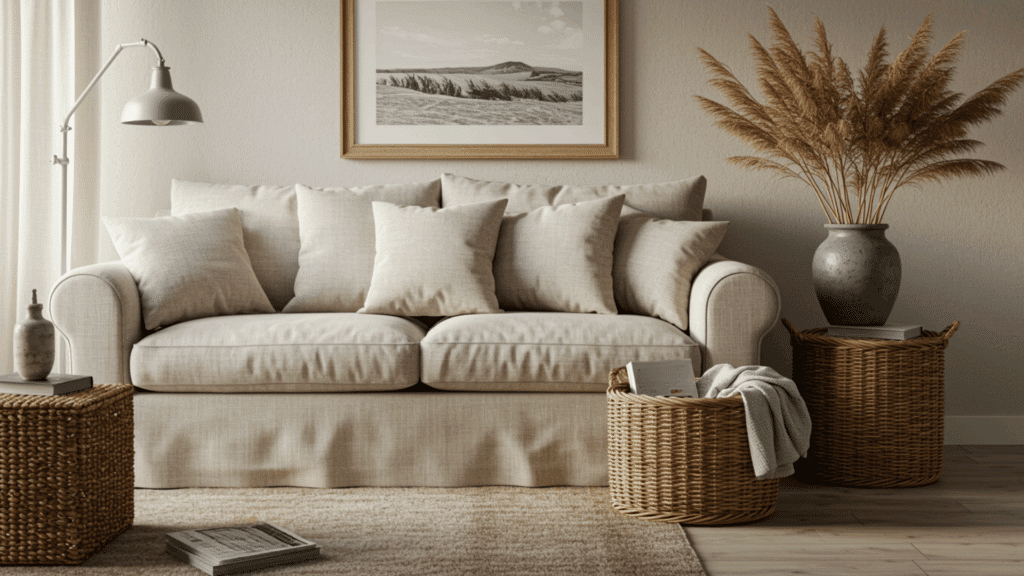
Organize with decorative baskets in varying sizes stored under console tables, beside chairs, or on shelving.
Choose seagrass, rattan, or wire baskets with handles for portability. The organic materials align with the emphasis on natural elements and practical beauty.
Baskets provide flexible storage solutions that move where needed while maintaining a cohesive aesthetic through repeated natural materials.
23. Distressed Wood Console Table
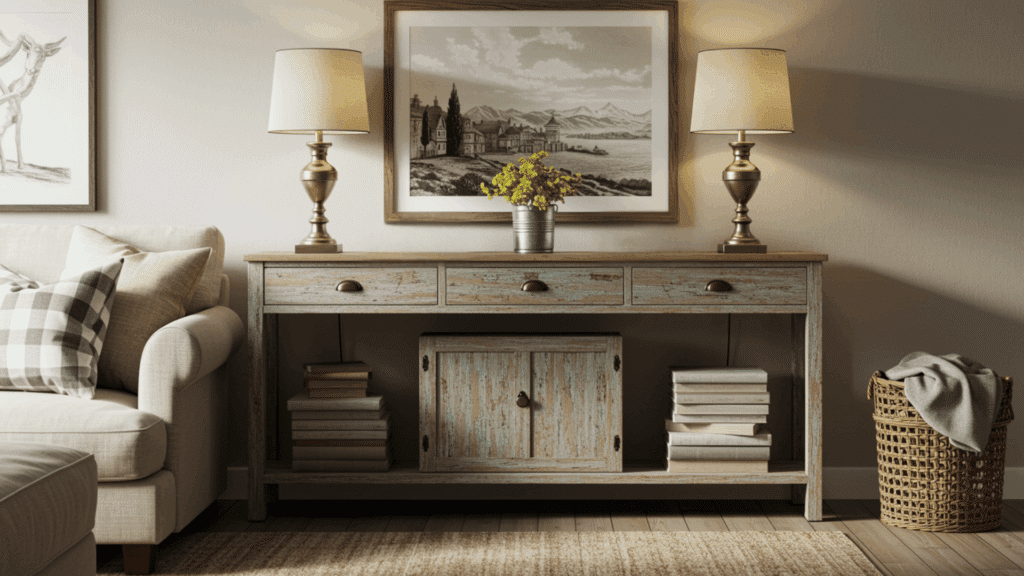
Position a long, narrow console table behind sofas or against walls for display and storage surfaces.
Weathered finishes and simple lines complement its style while providing functional spaces for lamps, books, and decorative objects.
The horizontal surface adds structural grounding while the distressed wood celebrates character and imperfection central to authentic design.
24. Farmhouse-Style Ottoman
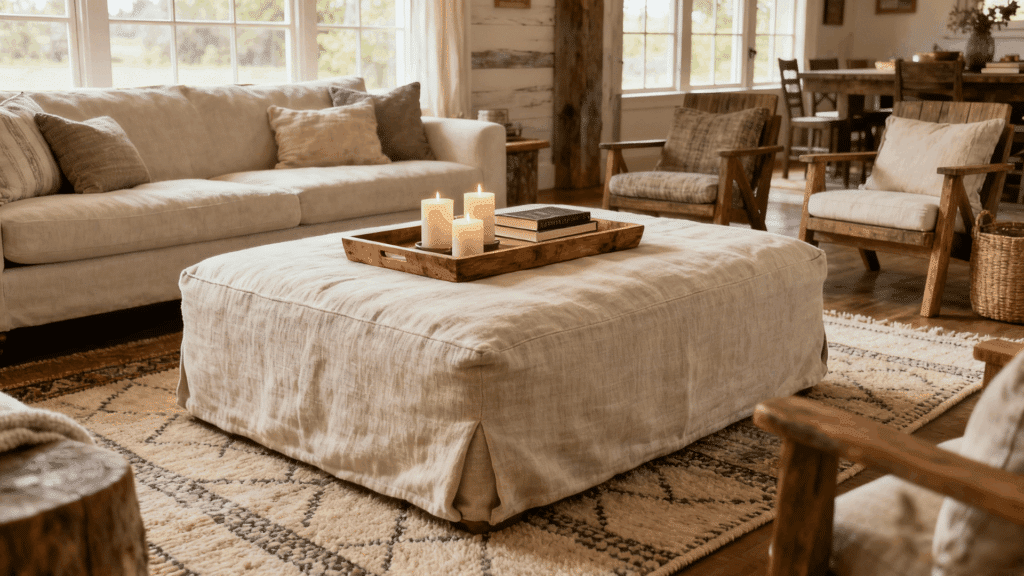
Anchor seating areas with large upholstered ottomans serving as coffee tables, extra seating, and footrests. Choose neutral ticking stripes, grain sack fabric, or solid linen in soft tones.
Add wooden trays on top for stable surfaces when serving drinks or displaying décor. The soft edges feel family-friendly and casual.
Ottomans provide versatile functionality while the substantial forms balance vertical elements. Storage ottomans hide blankets and toys, maintaining tidy spaces.
25. Neutral Pillow Layering
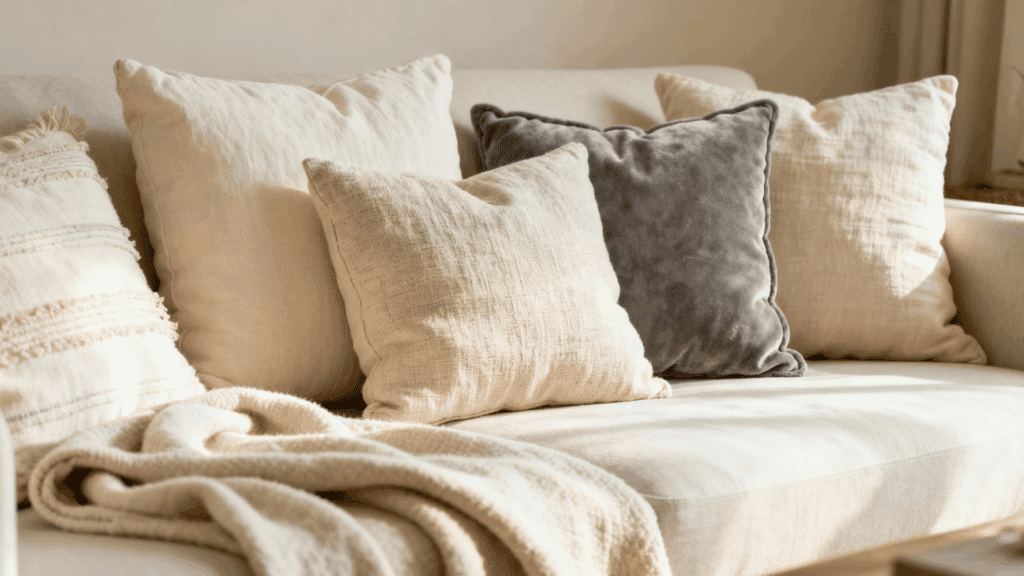
Style sofas with multiple throw pillows in varying sizes, textures, and subtle patterns, creating depth without chaos.
Start with larger pillows at the back, progressing to smaller decorative ones in front. Mix materials: linen, cotton, faux fur, and velvet for tactile interest.
The abundance signals comfort and hospitality. Change covers seasonally refreshing spaces affordably. Proper layering transforms sofas into inviting retreats.
26. Vintage Ladder Display
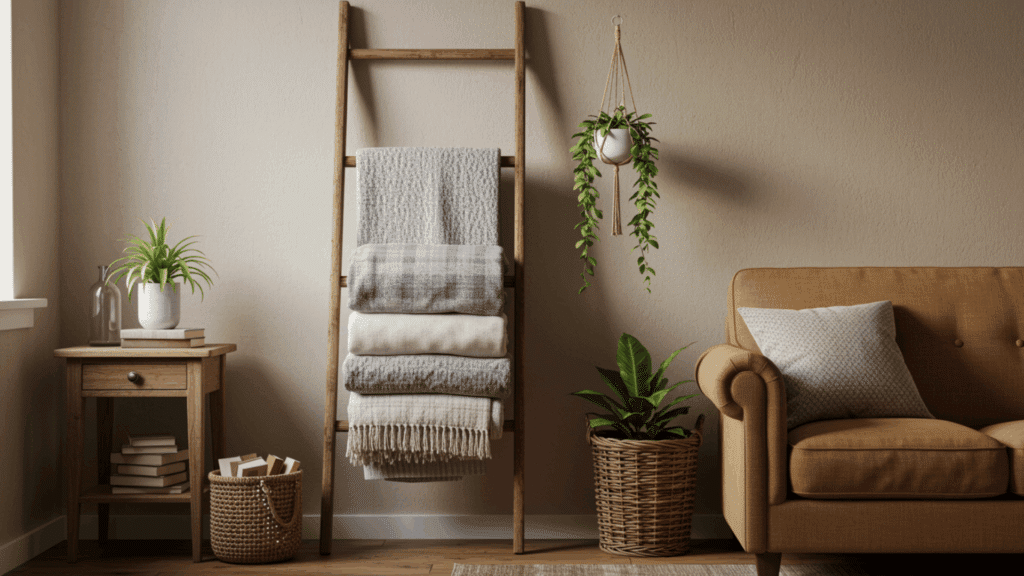
Lean a weathered wooden ladder against walls for vertical display, holding throws, plants, or seasonal decorations. The piece adds structural interest.
Paint for coordinated color or preserve natural patina for authenticity. Position near seating to access blankets easily or purely decoratively in corners.
Ladders introduce organic shapes and agricultural references, perfect for living rooms, while providing flexible display solutions.
27. Metal Accent Pieces
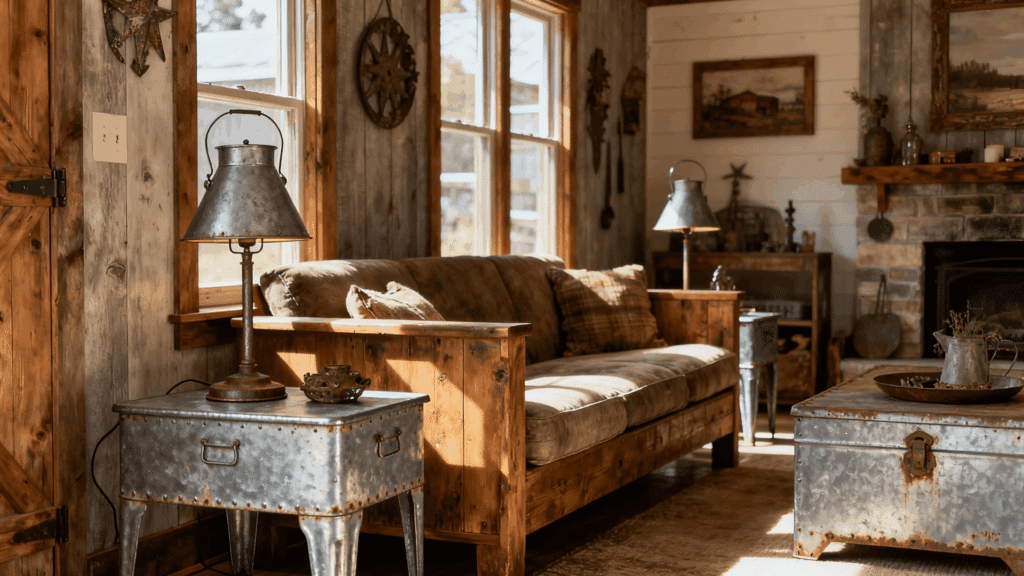
Balance warm wood with cool metal elements through side tables, lamps, or decorative objects. Galvanized finishes, aged brass, or industrial iron add textural contrast and visual interest.
The mixed materials prevent spaces from feeling too matchy or one-dimensional. Metal accents introduce subtle shine reflecting light while maintaining sensibilities.
Choose pieces with purposeful, simple designs, avoiding ornate details. These industrial touches ground style with practical, utilitarian beauty.
28. Built-In Shelving
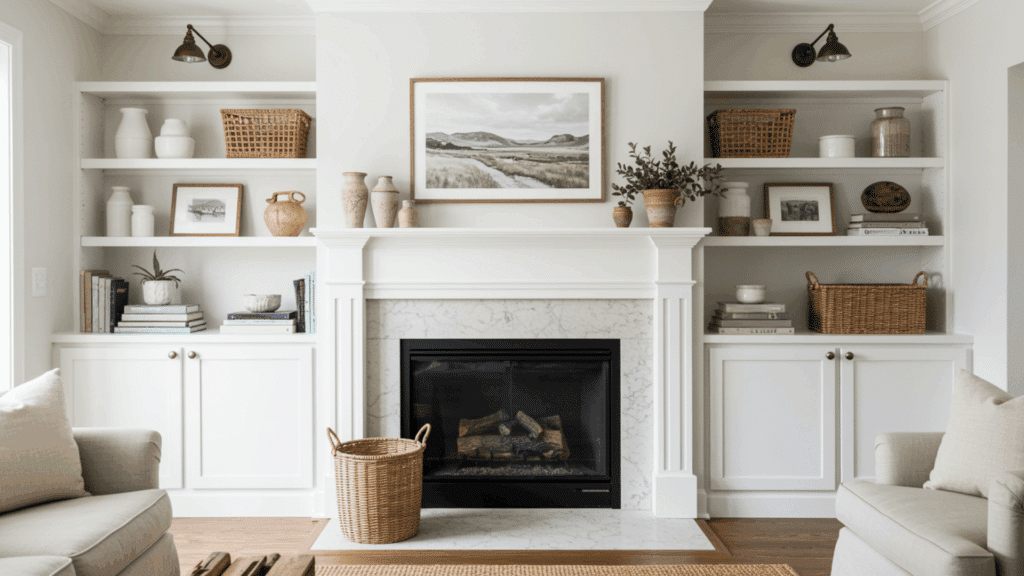
Flank fireplaces or fill entire walls with custom-built-in shelving painted white or soft gray for character and abundant display space.
The floor-to-ceiling storage maximizes vertical space while adding custom millwork detail. Style shelves with books, baskets, plants, and treasured collections, creating personalized displays.
Built-ins increase home value and provide seamless storage solutions. The symmetry feels ordered and intentional, grounding living rooms with permanent structural features.
29. Porch-Inspired Elements
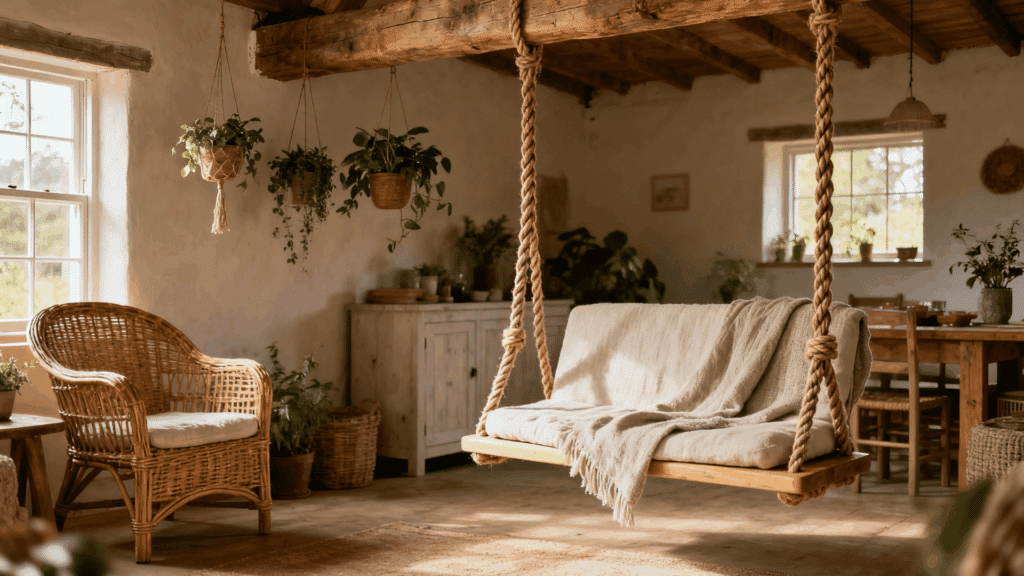
Bring the outdoor porch inside through wicker furniture, hanging plants, or porch swing-style seating suspended from ceiling beams.
These unexpected elements blur indoor-outdoor boundaries, creating relaxed, casual atmospheres. Include weathered wood, natural fibers, and potted greenery.
It adds personality and whimsy while celebrating the country living’s connection to nature. Ensure structural support for hanging elements and weather-appropriate materials for indoor use.
30. Simple Window Treatments
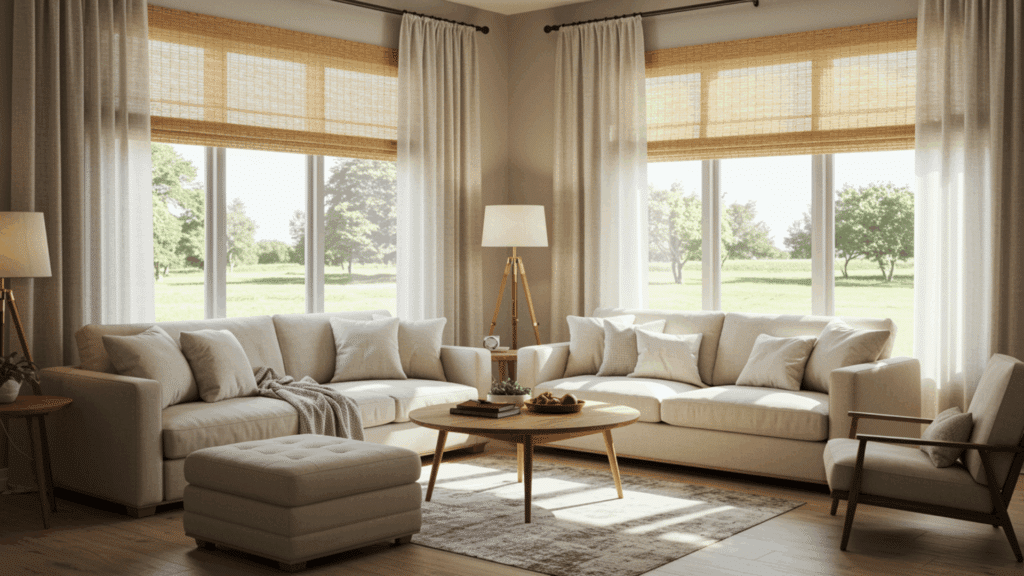
Dress windows with relaxed linen curtains, woven shades, or shutters in neutral tones, allowing natural light while maintaining privacy.
Mount curtains high and wide, making windows appear larger. Natural materials like bamboo shades add texture without competing for attention.
The understated approach keeps focus on views and structural features while softening hard edges. Simple treatments embody restraint and connection to the outdoors.
31. Slipcovered Furniture
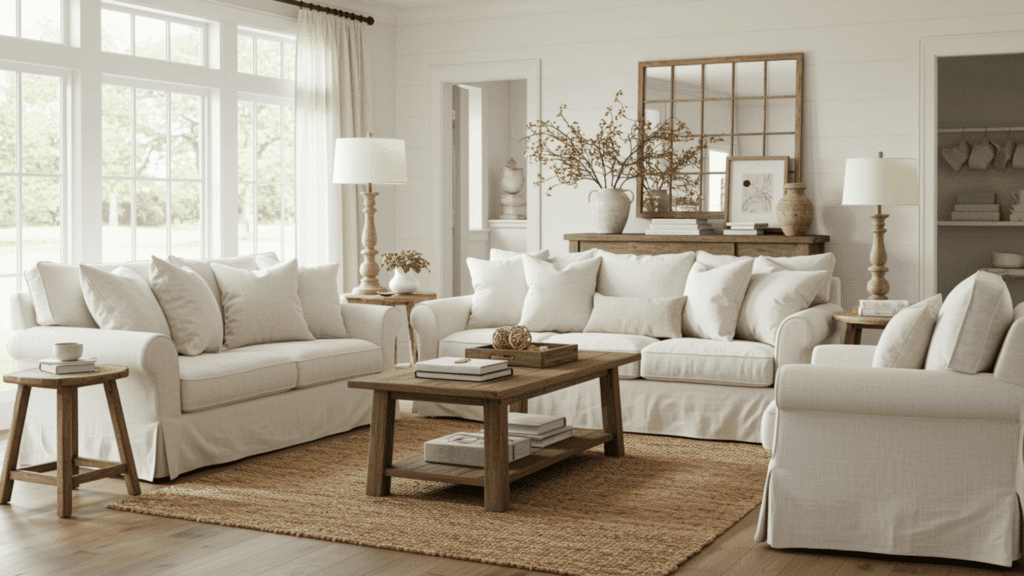
Choose washable slipcovers in natural fabrics like cotton or linen for practical, family-friendly elegance. The relaxed fit and casual drape reflect comfort.
Slipcovers update existing furniture affordably and change with the seasons, crisp white for summer, heavier textures for winter.
Multiple slipcover sets allow frequent refreshing, maintaining clean, inviting spaces despite active household use and pets.
32. Oversized Wall Mirror
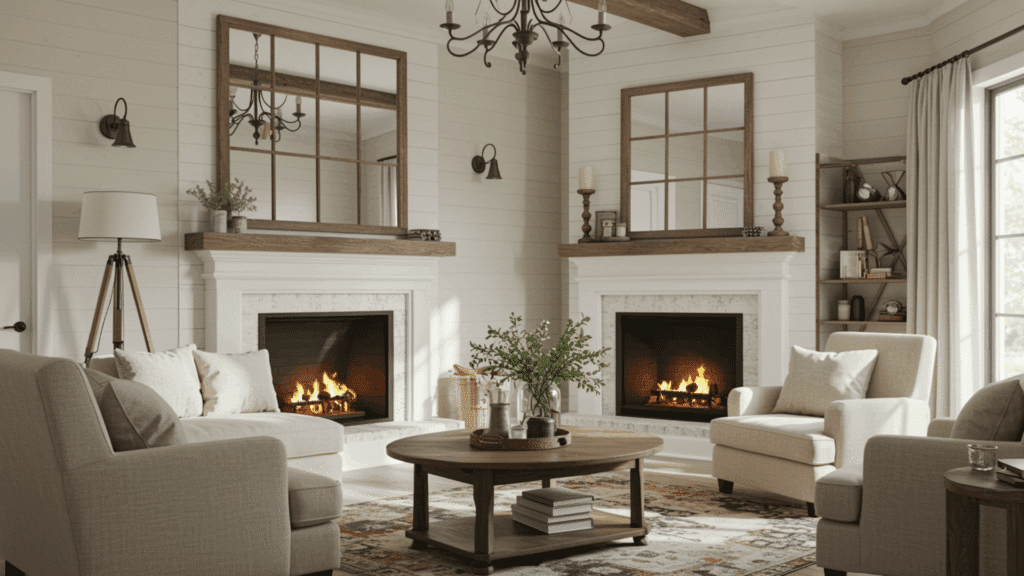
Reflect light and expand perceived space with a large mirror in weathered wood, metal, or windowpane-style frames.
Oversized mirrors make dramatic statements while serving practical purposes. The reflective surface brightens darker living rooms and adds elegance without overwhelming simplicity.
Choose frames complementing existing finishes, distressed white, natural wood, or aged metal, maintaining cohesive style throughout spaces.
33. Wooden Bench Seating
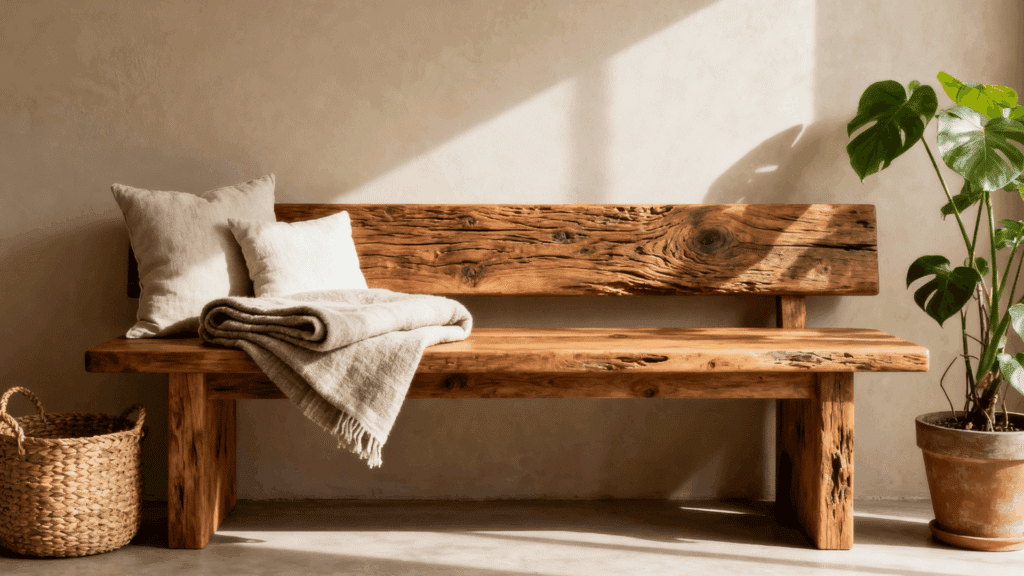
Incorporate wooden benches as alternative seating, coffee tables, or entry storage, combining functionality with authentic character.
Use benches under windows, creating cozy reading spots or at room entries for removing shoes. The versatile pieces move easily for flexible arrangements.
Weathered finishes or painted bases coordinate with existing furniture. Benches provide casual, unfussy seating options perfect for living’s relaxed nature.
34. Textured Accent Wall
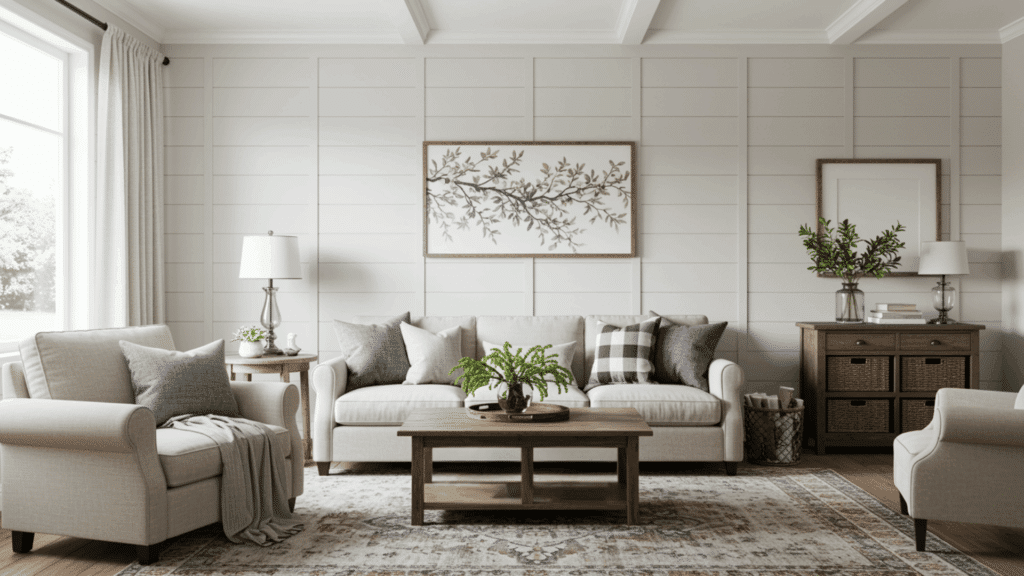
Create depth through board-and-batten, tongue-and-groove, or plank wall treatments, adding structural dimension.
These vertical or horizontal applications introduce shadow lines and tactile interest. Paint in coordinating neutrals, maintaining brightness while adding a subtle pattern.
Accent walls provide backdrops for furniture arrangements and artwork while solving bland wall challenges. The craftsmanship quality aligns with an appreciation for honest construction.
35. Greenery and Plants
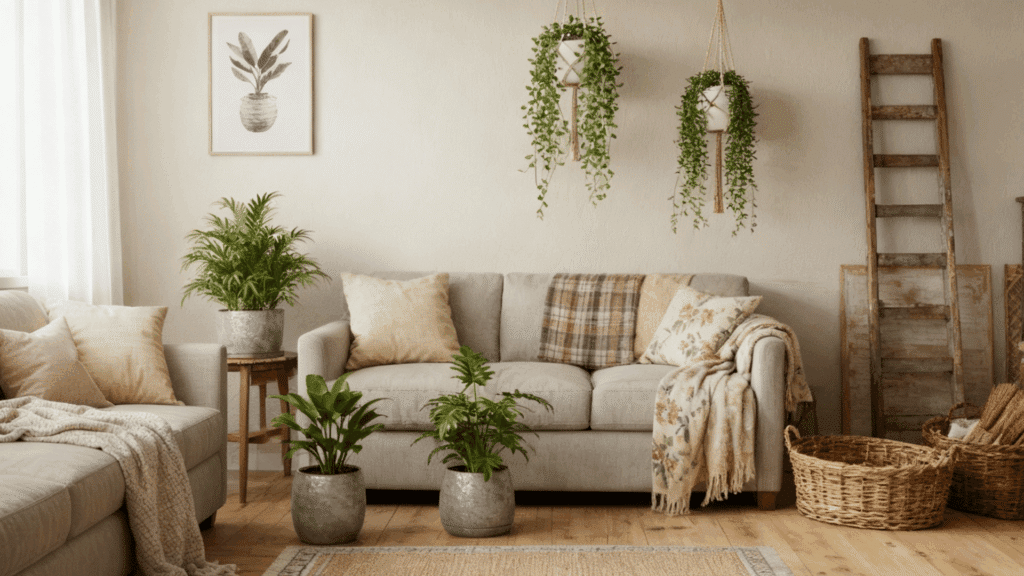
Incorporate living plants in ceramic pots, galvanized buckets, or baskets, bringing organic life and air-purifying benefits.
The natural elements soften hard edges and introduce color without overwhelming neutral palettes. Plants connect interiors with nature, celebrating ties to land and growth.
Choose low-maintenance varieties like pothos or snake plants for realistic care, considering lifestyle demands.
36. Grain Sack Textiles
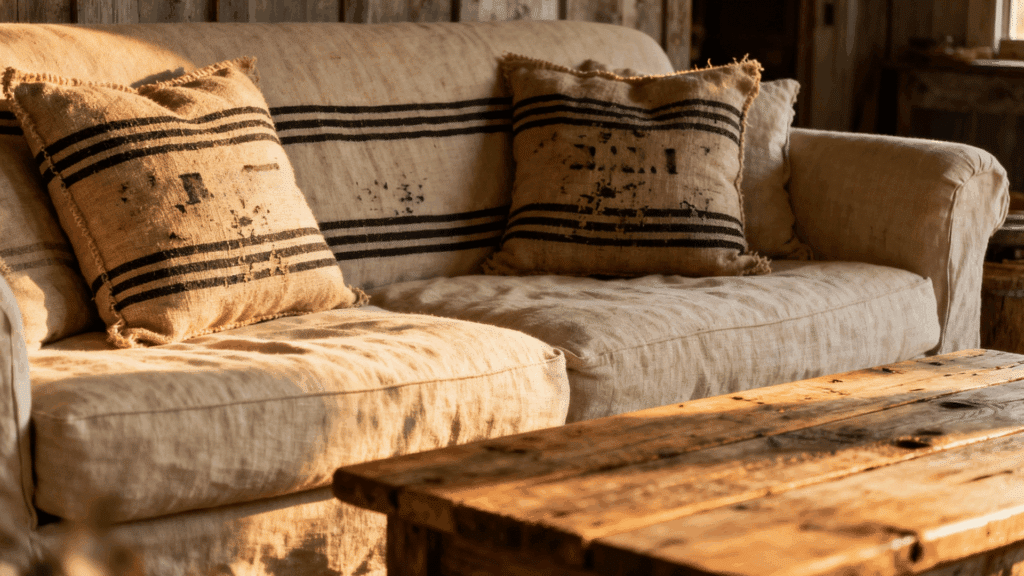
Layer pillows, upholstery, or table runners featuring vintage grain sack fabric with characteristic stripes and stamped lettering.
Natural linen backgrounds with dark stripe patterns add subtle interest without competing with other elements. Mix with solid neutrals and buffalo check, maintaining cohesion.
Grain sack patterns reference farming heritage while feeling and collected, bridging and refined interpretations beautifully.
37. Area Rug Layering
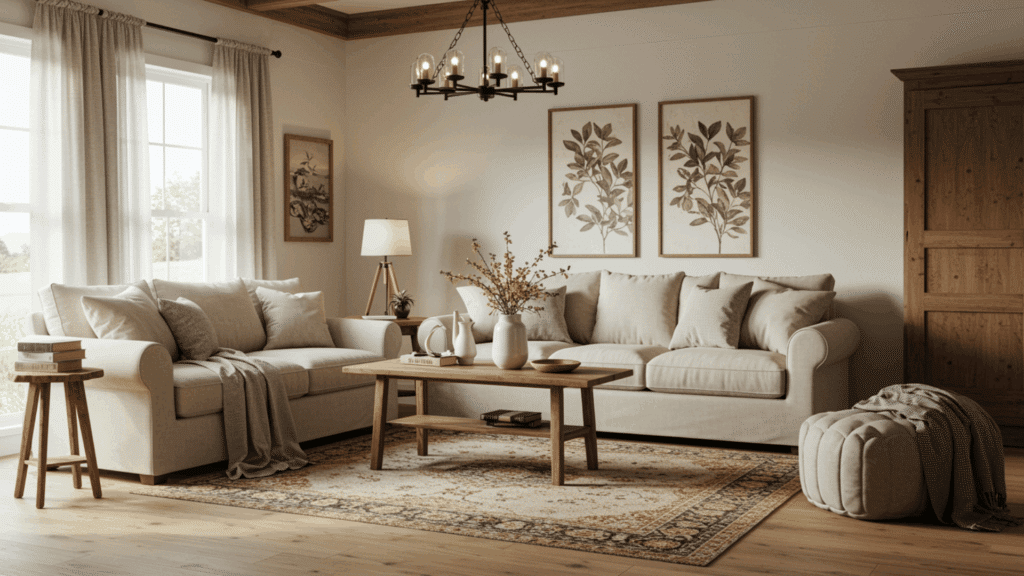
Create dimension by layering smaller patterned rugs over larger natural fiber rugs, defining seating zones.
The neutral base rug grounds spaces while decorative top rugs introduce pattern and color. Ensure top rugs are substantially smaller, preventing tripping hazards.
Layering works particularly well over jute or sisal, providing textural contrast. This designer technique adds depth without commitment to a single large, expensive rug.
38. Antique Structural Salvage
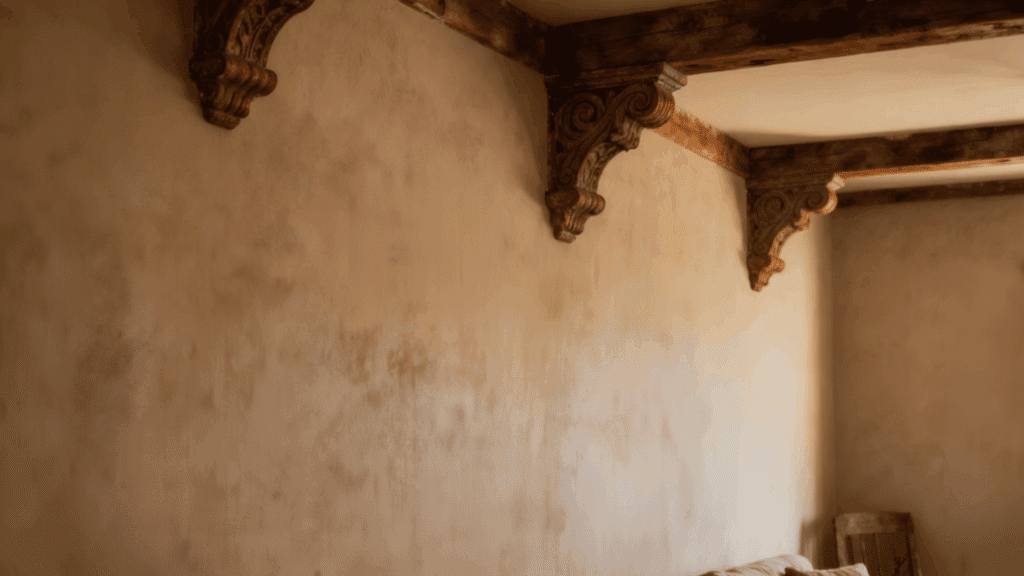
Display corbels, columns, window shutters, or iron gates as sculptural wall art celebrating history and craftsmanship.
Lean large items against walls or mount securely as dimensional displays. The aged finishes and purposeful construction showcase quality and authenticity.
Choose pieces that complement your home’s structural and scale appropriately to the wall dimensions available for display.
39. Neutral Painted Furniture
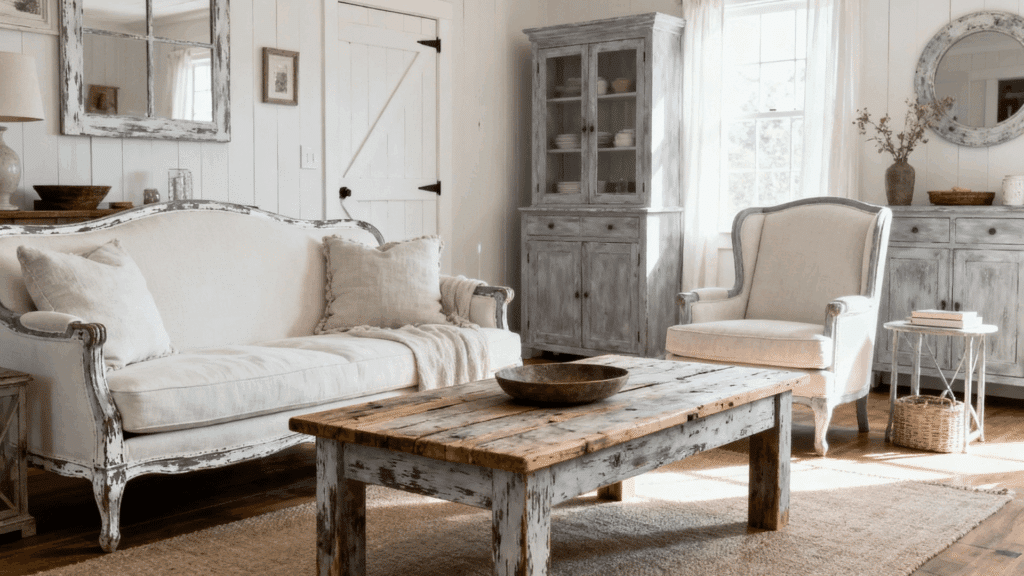
Unify mismatched furniture pieces through cohesive paint colors like soft white, warm gray, or creamy beige. Painted furniture feels intentional and collected rather than accidental.
Distress edges gently revealing underlayers for an aged appearance. Painted surfaces brighten spaces and coordinate with neutral palettes.
This approach allows mixing furniture styles, traditional, modern, and vintage, unified through color, creating cohesive collections without matching suites.
40. Cowhide or Sheepskin Accents
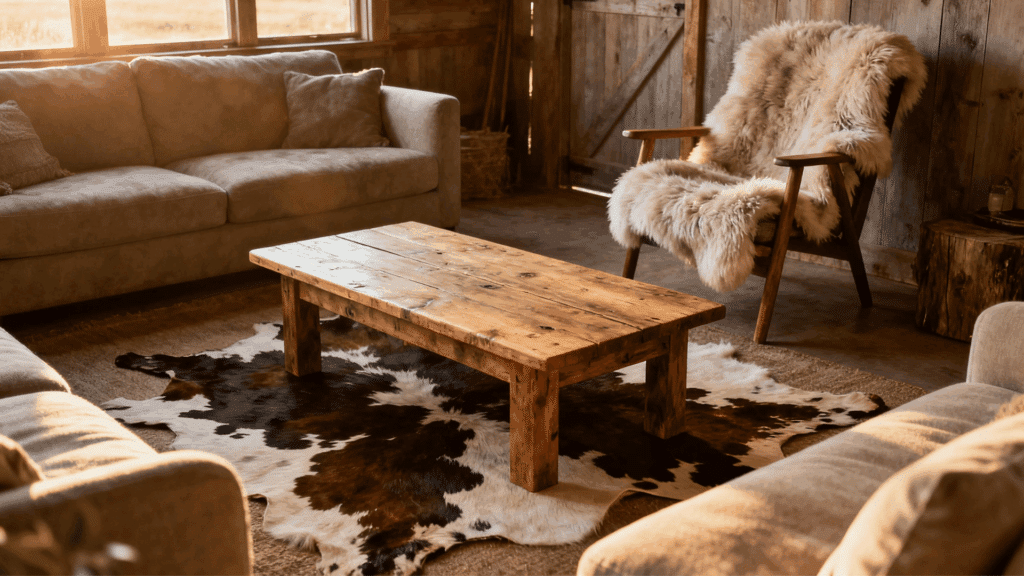
Layer cowhide rugs under coffee tables or drape sheepskins over chairs, adding luxurious texture and organic pattern.
Neutral tones coordinate universally while interesting patterns add visual intrigue. These durable materials withstand traffic and spot-clean easily.
The tactile luxury elevates spaces without feeling precious or overly formal. Animal hides are bridged and refined, creating collected, worldly aesthetics with natural beauty.
41. Symmetrical Furniture Arrangement
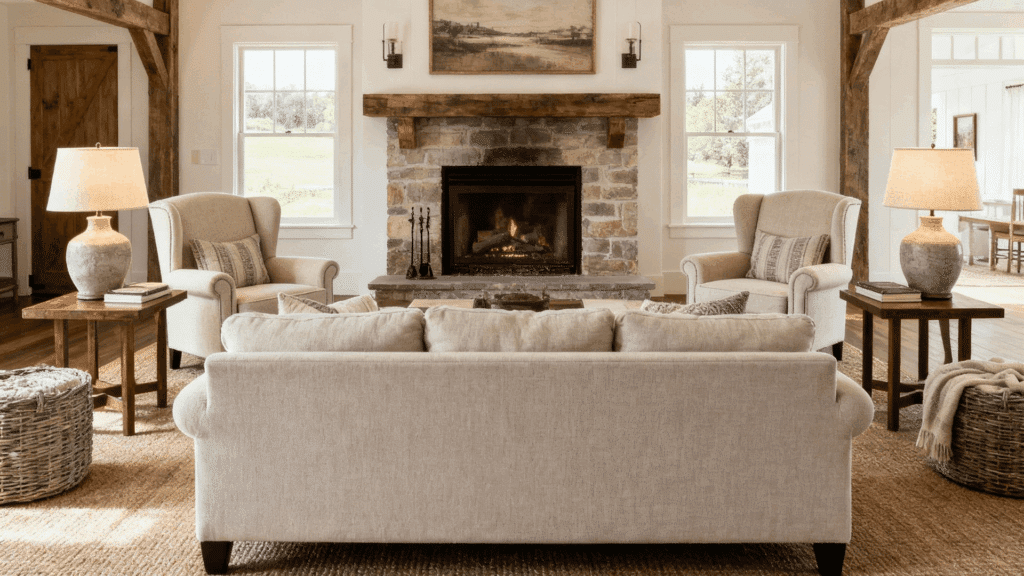
Balance rooms through matching pairs of identical chairs flanking fireplaces, matching lamps on side tables, or centered sofa arrangements.
The formal arrangement suits traditional interpretations while maintaining comfort through furniture choices. Balance doesn’t require identical items but coordinating weights.
Symmetrical layouts work particularly well in rectangular rooms and around structural focal points like fireplaces, providing natural center points.
Common Mistakes to Avoid
While designing a farmhouse living room, keep these common mistakes in mind to maintain balance, warmth, and authenticity:
- Overdecorating the space: Too many accents or signs can make the room feel cluttered rather than cozy.
- Using overly bright or bold colors: style thrives on soft, muted tones; avoid loud hues that disrupt the calm atmosphere.
- Ignoring modern balance: Leaning too heavily on vintage items can make the space feel dated; mix old and new for a fresh look.
- Neglecting texture variety: Relying on only wood or one material can flatten the design layer, fabrics, metals, and natural fibers.
- Choosing uncomfortable furniture: living rooms are meant for relaxation; avoid pieces that look good but lack comfort.
- Forgetting personal touches: Sticking strictly to trends can make the space feel staged. Add items that reflect your personality and lifestyle.
Conclusion
The farmhouse living room ideas we’ve seen demonstrate that this versatile style adapts beautifully from minimalist modern to richly layered traditional approaches.
Successful design isn’t about perfection but rather embracing character, mixing old with new, and creating spaces that genuinely reflect your family’s lifestyle and values.
The beauty of living room ideas lies in their flexibility and forgiving nature, allowing you to incorporate elements.
Gather your inspiration, assess your space, and begin making your living room into the cozy, welcoming farmhouse haven you’ve been envisioning!

